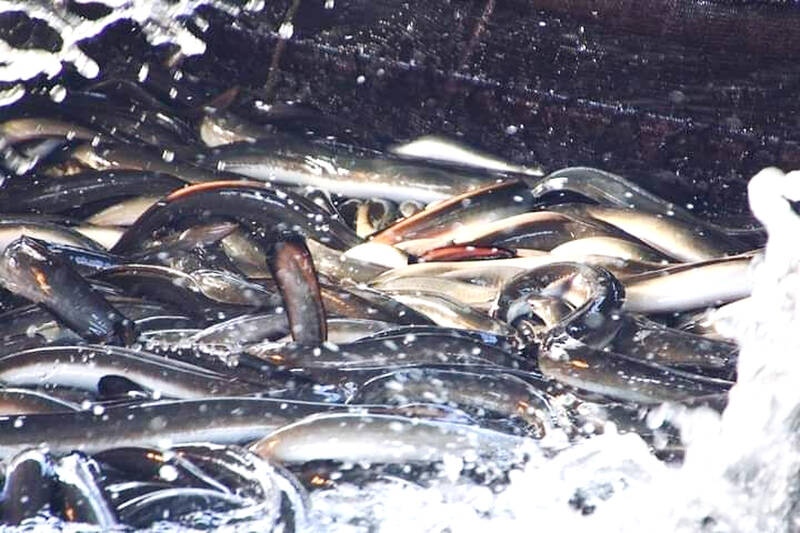Eel production in Taiwan has slipped behind that of other East Asian nations over the past few years, leaving producers looking for alternatives to the formerly lucrative export market.
Once the regional leader in eel production, Taiwan’s release of fry into farming ponds has fallen far behind Japan, China and South Korea.
Taiwan leads off eel harvest season in East Asia, which typically runs from Nov. 1 to the end of February the following year.

Photo : Tsai Tsung-hsun, Taipei Times
To supply Japan for “unagi day” in midsummer, eel fry must be released before the middle of January, making Taiwan the best place to supply its neighbor during the high season.
However, Japanese producers have in recent years begun purchasing eel fry from Taiwan at high prices to supply their domestic market, driving down Taiwan’s eel exports and breeding industry.
As a result, the market share of Taiwanese eel in Japan and the amount of fry released into farming ponds has been falling rapidly.
Taiwan only accounted for 1.2 percent of eel fry released in East Asia, at 320kg, the Nihon Yoshoku Shimbun, a Japanese trade journal focusing on the eel industry, reported on April 7.
Japan led the industry at 49.3 percent (13,553kg), followed by China at 32.7 percent (9,000kg) and South Korea at 16.9 percent (4,639kg).
Owing to China’s recent success in the industry, South Korea has begun importing significant quantities of fry from China and Hong Kong to boost its numbers, making Taiwan’s market share likely to fall below 1 percent, the publication said.
Taiwan’s eel exports had already begun to slide before the COVID-19 pandemic. Exports fell each year between 2018 and last year, from 2,396 tonnes to 1,654 tonnes during the period.
July was the most productive month each year, ranging from 182 tonnes in 2020 to 410 tonnes in 2018.
The worst hit to fry rearing came over the past two years, from 8,143.8kg in 2020 to 4,430.49kg in 2021, and only 877.33kg last year.
This year, only 320kg has been released.
Eel farming in Taiwan is being depressed by high fry prices and dwindling exports, Taiwan Association of Eel and Shrimp Production Cooperatives chairman Tang Ching-tsung (唐慶宗) said.
As the risk is high, farmers are reducing their stock, making their exports less competitive and continuing the downward cycle, Tang said.
The way to correct the problem is to keep harvested fry in Taiwan to replenish domestic farming ponds in preparation for Japan’s “unagi day,” he said.
Farmer Kuo Hung-yu (郭紘瑜) said that he used to frequently send large eel orders to Japan, but now only sends one or two containers at lower prices.
Most eel producers are waiting to see what might happen, Kuo said, adding that his strategy is to stabilize revenue by actively pursuing domestic buyers before seeking more export opportunities.
Farmer Tang Hsin-yuan (唐昕遠), who is newer to the business, agreed that fry are expensive and exporting to Japan is not cost-effective.
He is only rearing enough this year to satisfy domestic demand and is converting idle ponds to more competitive species.
Tang said that if he stuck with only rearing eel, there is a good chance he would lose money despite the great effort required.

Alain Robert, known as the "French Spider-Man," praised Alex Honnold as exceptionally well-prepared after the US climber completed a free solo ascent of Taipei 101 yesterday. Robert said Honnold's ascent of the 508m-tall skyscraper in just more than one-and-a-half hours without using safety ropes or equipment was a remarkable achievement. "This is my life," he said in an interview conducted in French, adding that he liked the feeling of being "on the edge of danger." The 63-year-old Frenchman climbed Taipei 101 using ropes in December 2004, taking about four hours to reach the top. On a one-to-10 scale of difficulty, Robert said Taipei 101

A preclearance service to facilitate entry for people traveling to select airports in Japan would be available from Thursday next week to Feb. 25 at Taiwan Taoyuan International Airport, Taoyuan International Airport Corp (TIAC) said on Tuesday. The service was first made available to Taiwanese travelers throughout the winter vacation of 2024 and during the Lunar New Year holiday. In addition to flights to the Japanese cities of Hakodate, Asahikawa, Akita, Sendai, Niigata, Okayama, Takamatsu, Kumamoto and Kagoshima, the service would be available to travelers to Kobe and Oita. The service can be accessed by passengers of 15 flight routes operated by

Taiwanese and US defense groups are collaborating to introduce deployable, semi-autonomous manufacturing systems for drones and components in a boost to the nation’s supply chain resilience. Taiwan’s G-Tech Optroelectronics Corp subsidiary GTOC and the US’ Aerkomm Inc on Friday announced an agreement with fellow US-based Firestorm Lab to adopt the latter’s xCell, a technology featuring 3D printers fitted in 6.1m container units. The systems enable aerial platforms and parts to be produced in high volumes from dispersed nodes capable of rapid redeployment, to minimize the risk of enemy strikes and to meet field requirements, they said. Firestorm chief technology officer Ian Muceus said

MORE FALL: An investigation into one of Xi’s key cronies, part of a broader ‘anti-corruption’ drive, indicates that he might have a deep distrust in the military, an expert said China’s latest military purge underscores systemic risks in its shift from collective leadership to sole rule under Chinese President Xi Jinping (習近平), and could disrupt its chain of command and military capabilities, a national security official said yesterday. If decisionmaking within the Chinese Communist Party has become “irrational” under one-man rule, the Taiwan Strait and the regional situation must be approached with extreme caution, given unforeseen risks, they added. The anonymous official made the remarks as China’s Central Military Commission Vice Chairman Zhang Youxia (張又俠) and Joint Staff Department Chief of Staff Liu Zhenli (劉振立) were reportedly being investigated for suspected “serious